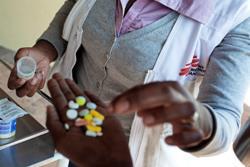Foetal Alcohol Syndrome is 100% preventable but not reversible

Now that her child is six years old, she wants other pregnant woman to learn the dangers of FAS, and to stop drinking when they are pregnant.
“I gave birth to my daughter and at first I was ashamed of her appearance. I didn’t take her to the clinic immediately and hoped she would start looking better. When she was two months old I took her to a doctor who diagnosed her with Foetal Alcohol Syndrome. He advised me to start taking her for her regular clinic appointments, which I did, and now she is healthy,” Deysel said.
For six years she has lived with regret.
Painful discovery
“Sometimes I hate myself. If I had not gone drinking while I was pregnant, my daughter would have been born free of FAS – because although FAS can be prevented, it cannot be reversed. The painful thing about FAS is when the child develops to a stage where they notice they are different to other children and start asking questions,” she said.
Sometimes I hate myself. If I had not gone drinking while I was pregnant, my daughter would have been born free of FAS – because although FAS can be prevented, it cannot be reversed.
“My daughter has started asking me why her body parts are so small, and she’s not as clever as her friends,” said Deysel.
Babies with Foetal Alcohol Syndrome suffer defects caused by heavy alcohol drinking by their mother during pregnancy. It is characterized by growth retardation, facial and neural abnormalities as well as malformations of other organ systems.
Clinical signs
Some of the clinical signs are: a low nasal bridge, an Epicanthic fold (a skin fold on the upper eyelid), small wide-set eyes, an upturned nose and thin upper lip, and an abnormally small and recessed chin.
Foetal Alcohol Syndrome is a serious condition according to nurse Bongiwe Buthelezi, who has advised Deysel to take good care of her child and not dwell on past events.
“Women who find out they are pregnant or even think they might be pregnant need to stop drinking alcohol and take antenatal education seriously. Mothers need to learn to take care of themselves during their pregnancy, and ensure that they do what is best for their baby,” Buthelezi said.
An edited version of this story appeared on Health24.
Author
Republish this article
This work is licensed under a Creative Commons Attribution-NoDerivatives 4.0 International License.
Unless otherwise noted, you can republish our articles for free under a Creative Commons license. Here’s what you need to know:
You have to credit Health-e News. In the byline, we prefer “Author Name, Publication.” At the top of the text of your story, include a line that reads: “This story was originally published by Health-e News.” You must link the word “Health-e News” to the original URL of the story.
You must include all of the links from our story, including our newsletter sign up link.
If you use canonical metadata, please use the Health-e News URL. For more information about canonical metadata, click here.
You can’t edit our material, except to reflect relative changes in time, location and editorial style. (For example, “yesterday” can be changed to “last week”)
You have no rights to sell, license, syndicate, or otherwise represent yourself as the authorized owner of our material to any third parties. This means that you cannot actively publish or submit our work for syndication to third party platforms or apps like Apple News or Google News. Health-e News understands that publishers cannot fully control when certain third parties automatically summarise or crawl content from publishers’ own sites.
You can’t republish our material wholesale, or automatically; you need to select stories to be republished individually.
If you share republished stories on social media, we’d appreciate being tagged in your posts. You can find us on Twitter @HealthENews, Instagram @healthenews, and Facebook Health-e News Service.
You can grab HTML code for our stories easily. Click on the Creative Commons logo on our stories. You’ll find it with the other share buttons.
If you have any other questions, contact info@health-e.org.za.
Foetal Alcohol Syndrome is 100% preventable but not reversible
by cynthiamaseko, Health-e News
September 29, 2016



